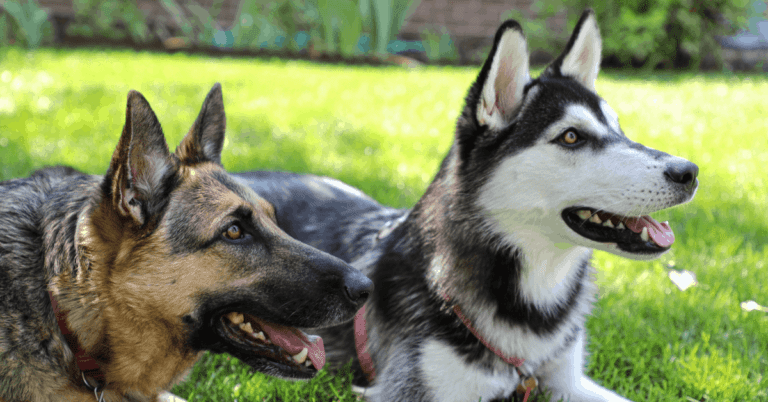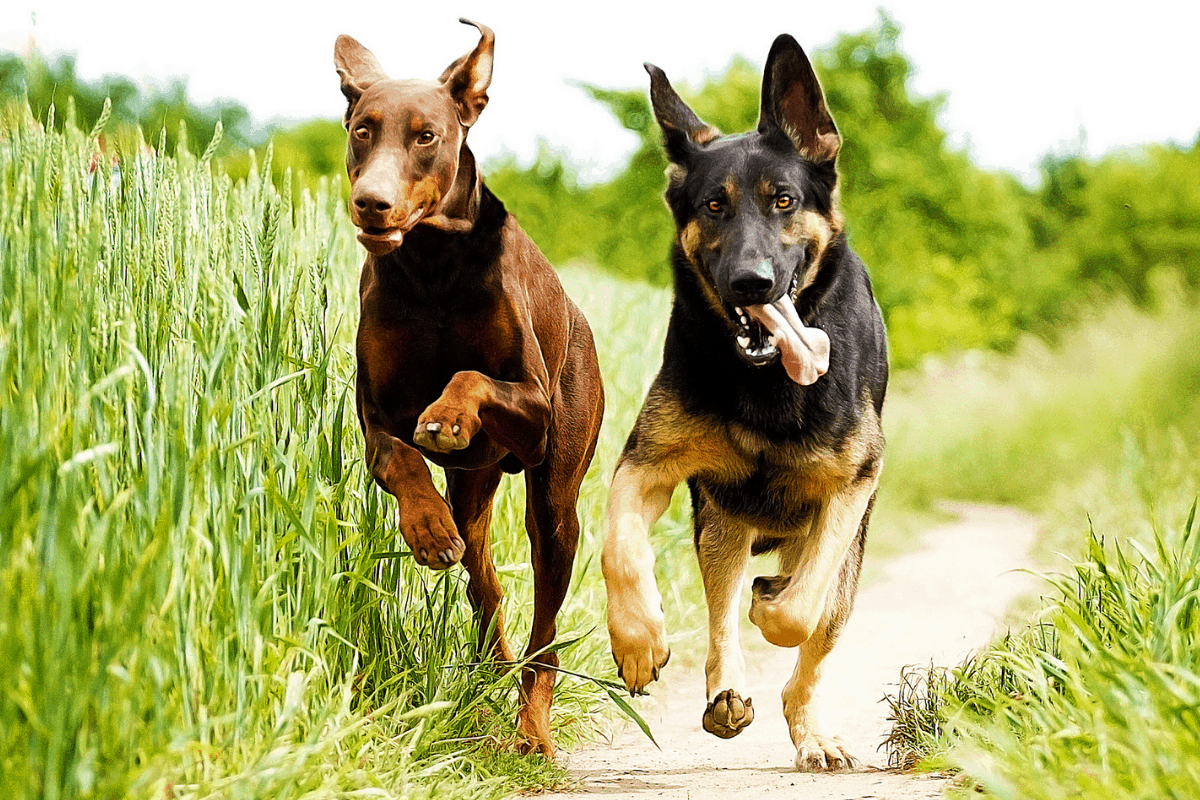Do you get along with all types of dogs? Are you considering getting a french beagle? German shepherds are large and dominating dogs.
If you aren’t sure you want a German shepherd, here is some information you should consider first.
German shepherds can be great family dogs, but it’s important to watch their weight.
Let’s start now.
Do German shepherds get along with other dogs?
Contents
German Shepherds get along well with other pets as long as the GSD has been socialized and trained before introducing it to another pet.
A GSD can be trained to coexist with other dogs by enforcing good behavior and mild discipline.
The amount of time and effort spent socializing and training on a dog can make them more or less tolerant.
GSDs are the perfect example of how much a dog can be shaped by training.
Dogs who have not been properly socialized and trained with other dogs are more likely to become aggressive or bite.
If a GSD isn’t properly trained, its level of obedience might not be very convincing.
Why Do German Shepherds Dislike Other Dogs?

German Shepherds are typically a loner breed.
This is part of their temperament. They do not like other dogs being around their owner, particularly when they are puppies.
This is because of the new situation that the dog faces. When a new puppy comes along, it is essential for both puppy and parent to bond.
Here is some reason why German shepherds don’t like other dogs.
Personality
Some German Shepherds are just less social than other dogs; therefore, they don’t make friends so easily.
This is more common among GSDs that were raised in a household with other pets. German Shepherds like to boss other dogs about their territory, which makes them less of a playmate for other dogs.
Despite this, German Shepherds don’t like certain other dog breeds.
German Shepherds dislike certain other dog breeds because of their intimidating appearance. This is commonly attributed to their strong, muscular bodies, large heads, and prominent, triangular-shaped ears.
Protectiveness
German Shepherds have a natural tendency to be deep-loyal.
If they believe another dog is trying to take over the space that your dog uses, they may show aggression by refusing to play or simply barking at and growling at their rival.
They’re also prone to biting during certain moments, especially toward the tail or ears.
Some may serve in the military, but others are house pets. Since they’re loyal and affectionate by nature, your GSD may even become attached to you.
As a consequence, they may become suspicious of everyone, even kids. This stems from their tendency to guard their owners’ territories and possessions.
You or a member of your family is likely to wind up being growled at if a GSD feels they don’t have the freedom to play with you or move where you want.
German Shepherds are speedy, agile, and strong, so they’re great working dogs. However, they don’t really look forward to working with other people, especially children.
Memory
The German Shepherd dog breed has a unique appearance. And they are easy to train.
Dogs, on the other hand, can be taught to cooperate with one another quite quickly.
Many canines are terrified of other dogs because they’ve known for their aggressive or domineering behavior. This is particularly true of German shepherds, who are typically quite docile.
They may only dislike dogs that look identical to those dangerous canine models.
Fear
It is perfectly normal for a German Shepherd to be territorial. However, this often leads to fights and threats. Some GSDs even attack playmates they don’t know.
They’re afraid of a lot of noises. Some of these noises include clapping, whistles, and noises from toys. Some GSDs may bark nonstop if they hear these noises, even if they don’t know the source.
If they haven’t been around other dogs for a long time, they may even be aggressive towards them at first.
Attention deficit hyperactivity disorder (ADHD) Some German Shepherds may exhibit symptoms of ADHD, which refers to the impairment of their ability to focus or pay attention.
They have trouble paying attention, controlling their impulsive behavior, and paying attention for long.
They may also have trouble dealing with other people’s moods or constantly changing situations.
This dread may grow into hostility based solely on the appearance or behavior of other dogs, even if they have not actually attacked them.
Not friendly or social GSDs are not naturally sociable. Many are skittish around other people or even dogs, though they can become close with the right person.
This may be because they do not possess the “playful” personality of other breeds or simply need more socialization and training.
How To Help Your German Shepherd Socialize With Other Dogs?
The most important step you can take, according to a professional dog trainer, is to make sure your dog is socialized at a young age.
Walking German Shepherds is beneficial since they get the opportunity to exercise daily. They need to be able to run or play hard at least once a day since many dogs live sedentary lifestyles.
You may take them to locations with dogs already so that your puppy gets used to being around other dogs.
During this time, make sure everyone remains calm.
Invite friends over and introduce them to your dog.
Dogs can quickly sense when their owners are getting angry. They would much rather play with someone who stays calm no matter what.
When their owners are suffering from an illness, the dogs tend to pay extra attention to them because they are in need of assistance with their basic needs.
After you’ve spent some time acclimating your German shepherd to the park, they may start sniffing around other dogs, but be prepared for them to take some time to warm up to other dogs.
Because your dog will most likely meet other dogs at a dog park, they need to be able to tolerate being around other dogs without being too aggressive.
The park fence may be utilized again once the dogs have learned to behave well together.
Giving them a treat when they participate in dog-dog interactions can help make them more eager to continue this behavior.
If your German shepherd dog’s socialization training isn’t going well and they want more, you can go online to see how to socially train them.
How to Socialize a German Shepherd Puppy
Puppies should be introduced to a broad range of potentially aggressive other animals to make sure they are appropriately socialized.
Puppies should not be left outside until they’re at least 16 weeks old.
There’s no reason why a puppy should be exposed to other dogs before he is properly vaccinated, and it’s safer all around to wait until he has seen his new surroundings.
It’s OK to expose your puppy to other dogs as long as he has never been around them before.
You may also socialize the puppy with other dogs outside.
Also Read: What Dogs Do German Shepherds Get Along With?
Conclusion
Plus, if your dog is aggressive with other dogs or pets, they may have to learn to co-exist with others.
This can also include other animals, such as cats and ferrets, or people if you’re not particularly keen on the idea of them being on public display in a dog park.
It may take some time for them to find their groove and form a positive relationship with a new type of pooch, but once they learn to, you will see great results!




